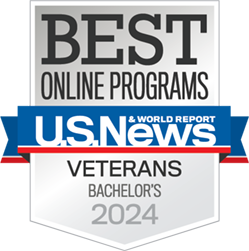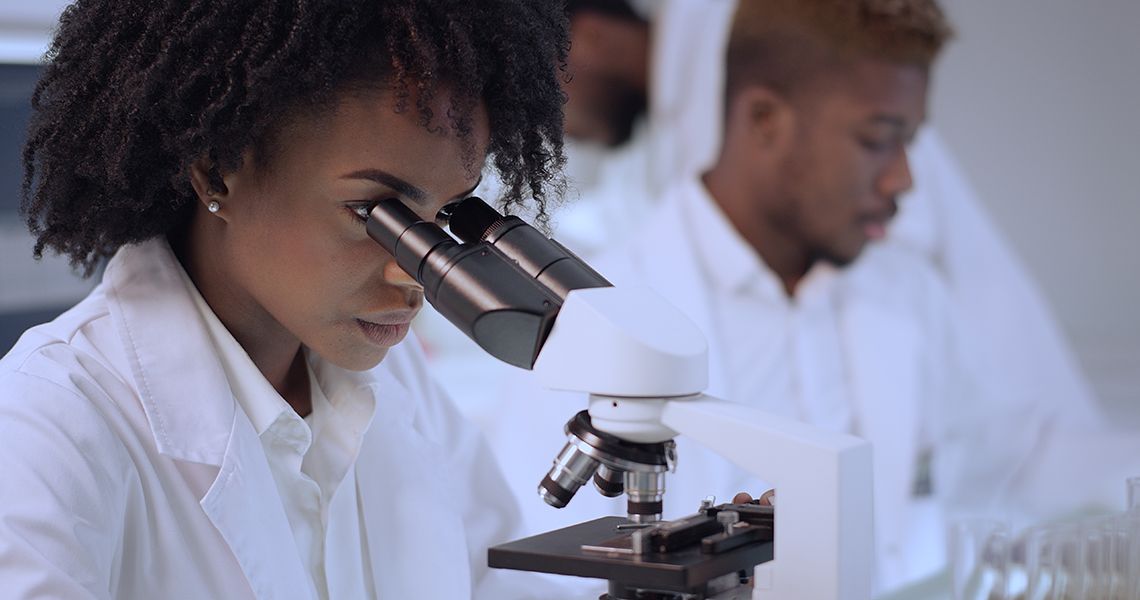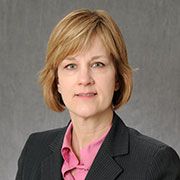
Take Your Next Step in Laboratory Science
100% Online
24 Months*
Earn your online Graduate Certificate or Master of Science in Health Sciences (MSHS) degree in Clinical Laboratory Management (CLM) from the George Washington University (GW). These programs prepare graduates to perform as laboratory managers in an exciting and rapidly evolving medical laboratory industry.
The CLM programs emphasize the following content areas: operations management, human resource management, quality systems management, and financial management as applied to the operation of a modern laboratory. In addition, other topic areas include leading a diverse and inclusive workforce, workforce education and training, and data analytics and research methods.
To learn more about our programs, you can register for our upcoming events.
*The total number of credits and duration of the program depend on the number of transferred credits
Program Highlights
Because of the shortages of qualified lab managers, we have streamlined the programs to save you time and money. Pick the option which best suits your career goals and timeline.
- Complete the 18-credit graduate certificate in as little as one year (three semesters), taking two courses per semester.
- Graduate with the 30-credit Masters of Science in Health Sciences (MSHS) degree in 24 months, taking two courses per semester.
- Prepare for the ASCP Diplomate in Laboratory Management (DLM) certification exam.
- The average Clinical Laboratory Manager salary in 2023 is $108,300.
In addition, these programs prepare you for the American Society for Clinical Pathology (ASCP) diplomate in laboratory management (DLM) certification examination. If you are an MLS/MT, have a master’s, and two years of full-time acceptable experience in clinical laboratory supervision or management within the last five years, you will be eligible to take this exam. You can also be eligible if you have a baccalaureate degree, are MLS/MT certified, and have four years of full-time acceptable experience in clinical laboratory supervision or management within the last eight years. See this link for additional ASCP Certification eligibility requirements.
Request Information
* Indicates required field
- Read: Privacy Disclaimer Acknowledgment
-
By submitting your contact information, you are providing your express consent authorizing GW and GW's representatives to contact you by email, phone, or text (including the use of an automatic dialing system). Standard text messaging and/or data rates may apply.
If you do not provide your contact information (phone and email), we may not be able to provide you with the information you requested.
If you provided your contact information but no longer wish to receive phone calls, emails, or text (SMS) messages from GW, you will have the option to opt-out. Emails and Text messages will include details for unsubscribing/opting out. To opt out of receiving phone calls from GW, contact us via email at info [at] hsprograms [dot] gwu [dot] edu (info[at]hsprograms[dot]gwu[dot]edu) or text/ call: 202-792-2819.
By submitting your information via this form, you also confirm that you have read and understood the GW Statement of Privacy Practices.
Note that the consent requested above is not required for enrollment in GW's programs. If you do not consent to providing the information requested on this form, you may contact us via email at info [at] hsprograms [dot] gwu [dot] edu (info[at]hsprograms[dot]gwu[dot]edu) or text/ call: 202-792-2819.
Accreditation and Rankings
- GW is accredited by the Middle States Commission on Higher Education
- #62 Best National University*
- #13 Best Online Bachelor's Programs*
- #7 Best Online Programs for Veterans*
* The U.S. News & World Report – 2024 Rankings



Curriculum
- 5-Semester Duration (30 credits)
- All courses in this non-clinical program are taught fully online and in an asynchronous format.
Program Outcomes
Upon successful completion of the program, learners will be able to:
- Perform strategic assessment of the lab practices and protocols and implement adequate corrective actions, when necessary, to ensure staff and patient safety and institutional, state, and federal compliance.
- Demonstrate effective communication and training strategies with clinical laboratory staff, patients, healthcare team members, and institutional administrators.
- Utilize the appropriate human resource tools to evaluate potential lab employees, assess the quality and productivity of laboratory staff, and ensure retention and succession of qualified lab professionals.
- Apply different leadership and management practices to produce effective fiscal outcomes in a clinical laboratory while ensuring optimal patient care.
- Conduct research in clinical laboratory management, training, or related area utilizing the process of literature review, research design, data analyses, results dissemination, and standard ethical practices appropriate to the area of research.
Who Is the Ideal Student for This Program?
These programs prepare you for the American Society for Clinical Pathology (ASCP) diplomate in laboratory management (DLM) certification examination.
If you are an MLS/MT, have a master’s, and two years of full-time acceptable experience in clinical laboratory supervision or management within the last five years, you will be eligible to take this exam. You can also be eligible if you have a baccalaureate degree, are MLS/MT certified, and have four years of full-time acceptable experience in clinical laboratory supervision or management within the last eight years See this link for additional eligibility requirements.
Career Outlook
Employment Opportunities. After this program, you are prepared as clinical laboratory managers including supervisory roles in hospital, public health and reference laboratories, biotechnology industries, and government and educational institutions. The average Clinical Laboratory Manager salary in the US is $108,300 in 2023, with a range between $96,100 and $120,500 (Source: salary.com).
Admission Requirements
To be accepted into this program, you must have:
- Completed application
- A baccalaureate degree from a regionally accredited institution and a 3.0 GPA on a 4-point scale
- Official transcripts from all previous institutions
- Two letters of recommendation
- Resume/CV
- Personal Statement
- Two years working experience in an accredited laboratory (CAP, TJC (formerly JCAHO), or equivalent)
- Valid medical (or clinical) laboratory technologist/scientist or specialist certification.
Tuition Details
The MSHS in Clinical Laboratory Management program at GW consists of 30 credit hours. Please find the cost per credit hour and total estimated program costs here.
Note: Tuition rates are subject to change and additional fees may vary by program.
Meet the Program Director

GW’s experienced faculty provide you with the rich, practical knowledge and support needed for you to succeed in the program and in your career.
Carol Rentas, PhD, MEd, MT(ASCP)SCCM,MBCM
- Read Full Bio
-
Dr. Rentas has more than 25 years of experience in clinical laboratory science and education. She worked as a medical laboratory professional in hospitals across the country before moving into education. Dr. Rentas has taught or is presently teaching online and hybrid courses in clinical laboratory management, clinical biochemistry, microbiology, urinalysis and body fluids, and immunohematology.
Curriculum Details
- 5-Semester Duration (30 credits)
- All courses in this non-clinical program are taught 100% online and in an asynchronous format.
Required Courses (27 Credits)
- MLS 6160: Data Analytics and Research Methods in Laboratory Medicine
-
The course reviews the basic methods and practices for conducting valid and ethical research in the clinical laboratory. Topics include literature review, research populations and designs, research ethics, data management and analytics, and research publication. (3 credits)
- MLS 6243: Education and Assessment in the Medical Laboratory
-
This course studies the process of instructional design as applied to the education and training of MLS professionals. Topics include a fundamental review of instructional strategies, needs assessment, task analysis, analysis of subject matter content, the development of goals and objectives, lesson design, and the assessment of instructional outcomes. This is a project-oriented course in which students will design, develop, and evaluate a set of MLS instructional materials and assessment tools. In addition, current trends in instructional design as applied to the MLS field will be explored. (3 credits)
- MLS 6244: Research Ethics and Integrity
-
This course addresses traditional and modern topics in research ethics and scientific integrity. The purpose of this course is to emphasize ethical theory and principles of bioethics while planning and conducting scientific studies. Through lectures, reading assignments, case studies and discussion sessions, the following topics are covered: ethical theory and principles, scientific and academic integrity, informed consent in research; Intuitional Review Boards and the use of human subjects in research. IACUC and the use of animals in research, Institutional Biosafety Committees, and the use of recombinant DNA in research; conflicts of interest and commitment; authorship and publication; the peer-review process; collaboration and mentoring; methodology, data reporting and data management; ownership of data and intellectual property; whistleblowing and dispute resolution; and privacy and confidentiality. Students learn to conduct unbiased peer-review, conduct research and report on an independent examination of a case of research misconduct or other ethical issue, and participate in oral scientific and ethical discussions. (3 credits)
- MLS 6245: Current Topics in MLS
-
Exploration of findings within the medical laboratory science field. Current topics will be integrated into the development of a required project proposal for the capstone research project that the student will complete in the following semester. (3 credits)
- MLS 6246: DLM Capstone Project
-
This course allows students to apply the knowledge gained throughout the program through the completion of an independent, mentored project. A proposal for the capstone project is developed by the student as a component of the Current Topics course of the previous semester. Note: the project would be specific to clinical laboratory management and prepare students to challenge the ASCP DLM certification exam. (3 credits)
- MLS 8001: Clinical Laboratory Operations Management
-
This course provides the managerial skills to operate a modern clinical laboratory and will cover safety and emergency management, facilities management, test method comparison and process validation, strategic planning and project management, as well as communication strategies both within the organization and the market at large. Additional topics include hospital and laboratory information systems management, performance monitoring, and change management. (3 credits)
- MLS 8002: Personnel Management in the Clinical Laboratory
-
This course covers the foundational theories of human behavior as it directly applies to managing a clinical laboratory. Topics covered include human needs, emotional intelligence, workplace motivation, recruitment, hiring, separation, staffing and scheduling, staff training and development, performance compliance, compensation and benefits, and succession planning. (3 credits)
- MLS 8003: Lab Quality Systems and Regulatory Compliance
-
This course reviews the quality management practices necessary to maintain a quality management system (QMS) that directly impacts the integrity and reliability of patient laboratory results. This includes methods that assess laboratory protocols and outcomes and those used to implement adequate corrective actions, when necessary, to ensure staff and patient safety and institutional, state, and federal compliance. Additional topics include laboratory QSEs, specimen integrity, pre-analytical, analytical, and post-analytical process review, turnaround times, document control, CLIA, ISO clinical laboratory regulatory processes (CLIA, ISO, etc). (3 credits)
- MLS 8004: Finance for Laboratory Managers
-
This course provides the essential skills in the financial management of a clinical laboratory. This includes becoming proficient at general financial tasks (budgets, income statements, and cash flow analysis) as well as understanding the market structure of the clinical laboratory industry and honing skills such as strategic profitability planning and assessment and revenue generation. Additional topics include the acquisition of capital equipment, competitor analysis, CPT coding, medical reimbursement, contract negotiations, and clinical laboratory materials management. (3 credits)
- One three-credit elective course, with the approval of program director
-
Suggested Elective Courses
MLS 6159: Leadership in Laboratory Medicine
Leadership characteristics and styles and assessment of their strengths and weaknesses. Applying effective leadership strategies and decision making in the laboratory medicine setting. (3 credits)COHM 6210: Strategic Communications
Using effective communication in the health care environment to maximize operational outcomes, critical evaluation of personal communication styles. (3 credits)HSCI 6223: Topics in Health Care Leadership
Requires students to think critically about leadership concepts by analyzing and evaluating academic articles associated with leadership, change management, and systems development. Topics in Healthcare Leadership is designed to use course content as a mechanism for developing critical thinking skills. This is a course that requires academic writing, contrasting, and comparing ideas, and extrapolating current literature into practical application. The focus is on thinking. While very structured, the course is not didactic in nature. This course is interdisciplinary and exposes students to other disciplines and worldviews that make up the health care sector in society, broadening the student’s overall perspective. (3 credits)
Key Dates
|
Summer 2026 |
Fall 2026 |
Spring 2026 |
|
| Application Deadline |
March 20, 2026 (Open) |
July 20, 2026 (Open) |
November 19, 2025 (Closed) |
To be accepted to the MSHS in Clinical Laboratory Management program (100% online), you must have:
Admission Requirements
| Degree and Minimum GPA | A baccalaureate degree from a regionally accredited institution and a 3.0 GPA on a 4-point scale |
| Transcripts | Official transcripts from all previous institutions |
| Personal Statement | Applicants must include a 250–500 word essay describing your reasons for undertaking study at GW, your academic objectives, career goals, and related qualifications including collegiate, professional, and community activities relevant to your program of interest. Include any substantial accomplishments not already mentioned on the application form. |
| Official GMAT/GRE Score | Not required |
| Additional Requirements |
Valid medical (or clinical) laboratory technologist/scientist or specialist certification. Two years working experience in an accredited laboratory (CAP, TJC (formerly JCAHO), or equivalent). |
Two Letters of Recommendation
Letters of recommendation should be from:
- Academic instructors who can strongly attest to your academic ability, and/or
- Individuals who served in a supervisory capacity for you, and who can strongly attest to your work ethic.
- The recommender cannot be from a family or friend.
Recommender will submit a letter on letterhead with a signature and credentials/contact information via the application portal.
International Students
Effective Fall 2025
International students should check with individual programs regarding eligibility for visa sponsorship. Generally, online and hybrid programs are not eligible for student visa sponsorship from GW. This would include transfer students from any other institution with an existing visa. To be considered for admission, there are required scores that you will need to meet. Score requirements may differ by school and program so check the admissions requirements for your program.
Applicants who have not completed a post-secondary degree from an institution where English is the sole language of instruction are required to submit TOEFL, IELTS, PTE Academic, or the Duolingo English Test scores to be considered for admission. The following are the minimum scores for admission consideration:
- TOEFL: 600 on paper based, 250 on computer-based, or 100 Internet-based,
- PTE: overall score of 68,
- IELTS: an overall band score of 7.0, with no individual band score below 6.0
- DET overall score of 120.
Undergraduate applicants who meet one of the following conditions may be considered for admission without submitting TOEFL, PTE or IELTS or DET scores:
- You have earned an associate’s degree or higher from an institution where English is the sole language of instruction
- You are a citizen of an English-speaking country
Scores may not be more than two years old. To ensure TOEFL scores are sent to GW, use institutional code 5246. An institutional code is not required to send IELTS or PTE scores to GW. DET scores must be submitted via the Duolingo English Test system directly to GW.
Based on the results of your English Proficiency exam results and your application, you may be required to take English for Academic Purposes (EAP) during your first year of study at GW. Please note that GW evaluates each application holistically so applicants may still be recommended for EAP even if they meet the requirements for exemption. Students placed in EAP courses should anticipate additional tuition expenses as well as possible extension of time needed to complete their degree programs.
Official transcripts from institutions outside the U.S. must be accompanied by an official transcript evaluation from an accredited independent evaluating agency. Please be sure you request a detailed evaluation that includes all course titles, credit hours, grades, U.S. degree equivalency, grade-point averages (GPA), and date of degree conferral (course by course evaluation). For a list of acceptable foreign credential evaluation services, please visit NACES.
Supporting documents not submitted online should be mailed to:
Mail: George Washington University
ATTN: Transcript Processing Center
1415 W 22nd St.
Suite 220
Oak Brook, IL 60523
Alternatively, official electronic transcripts can be sent to: transcripts [at] hsprograms [dot] gwu [dot] edu (transcripts[at]hsprograms[dot]gwu[dot]edu)